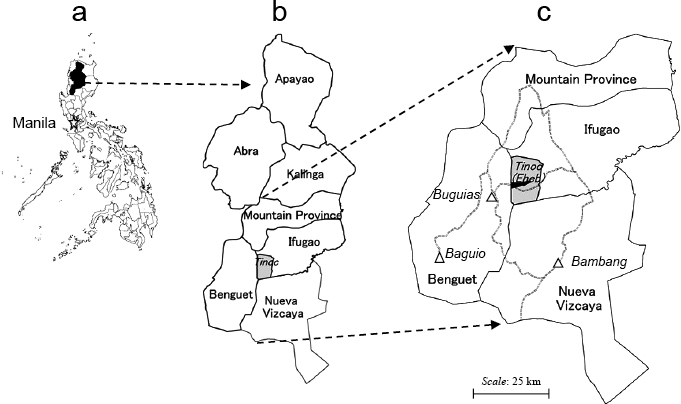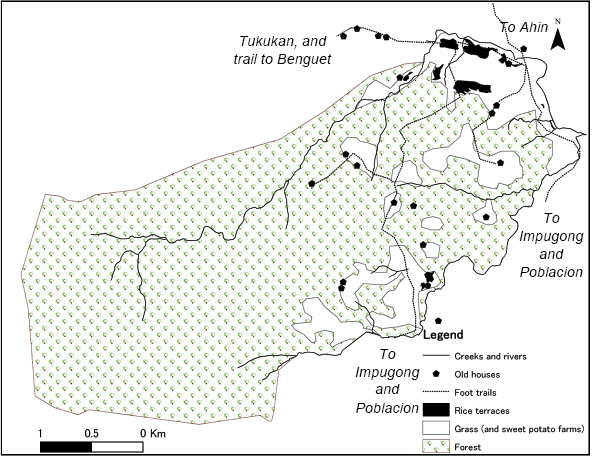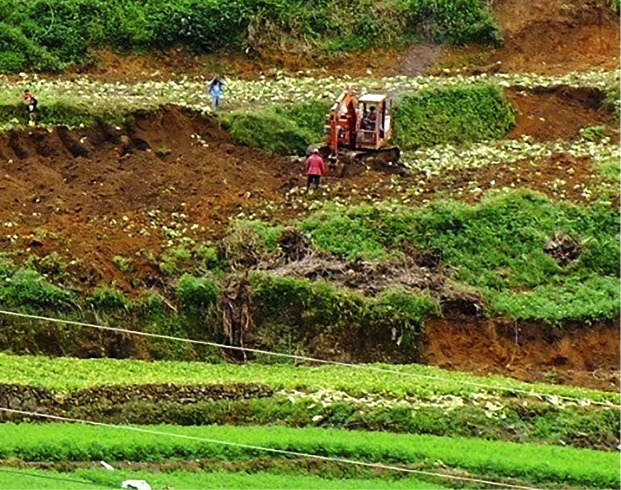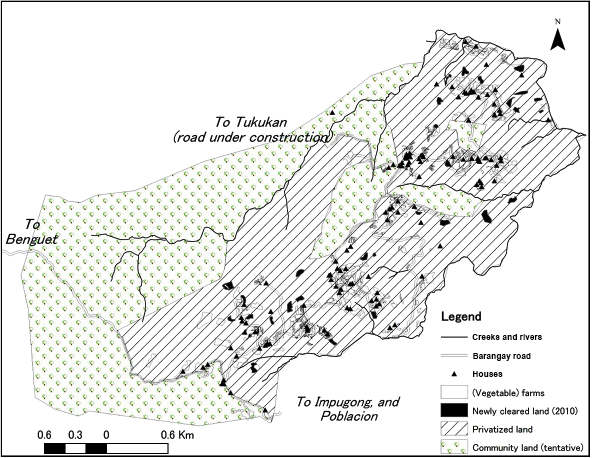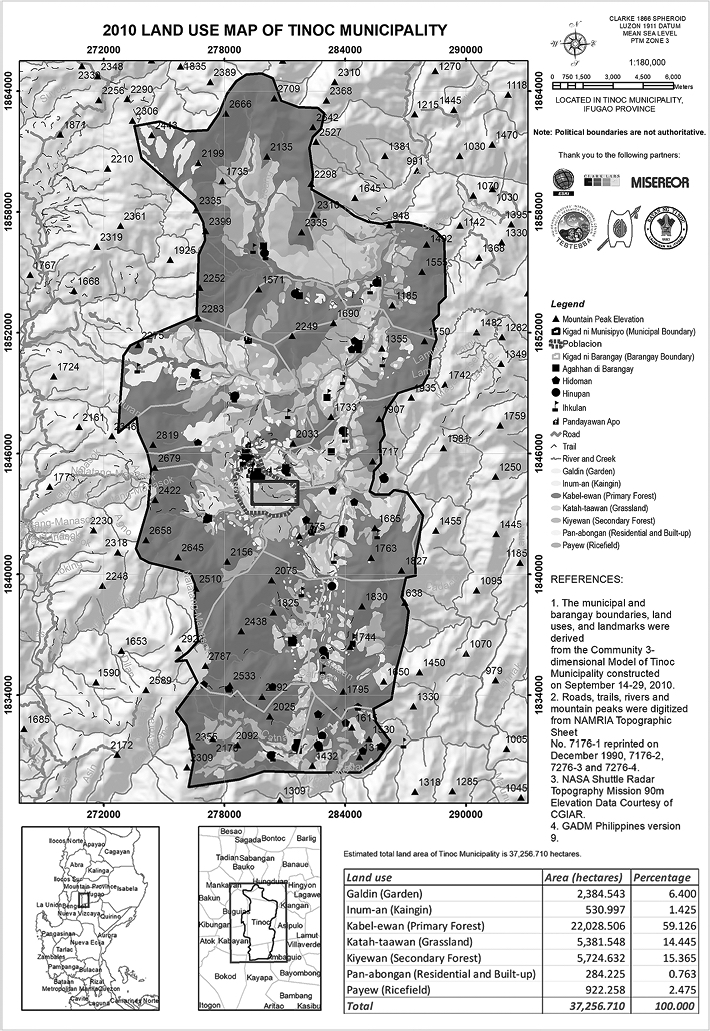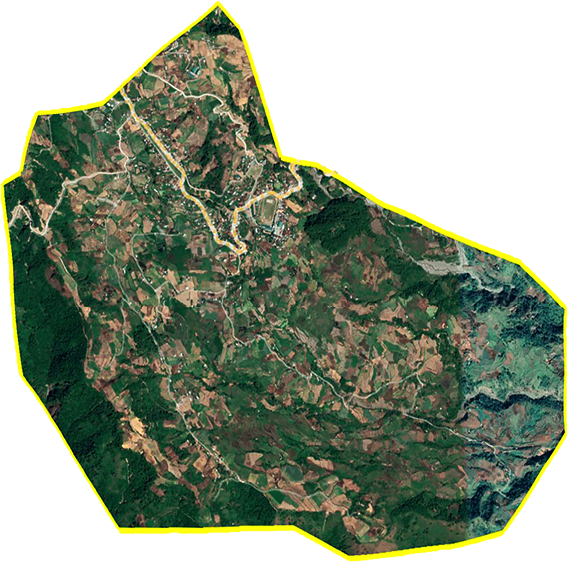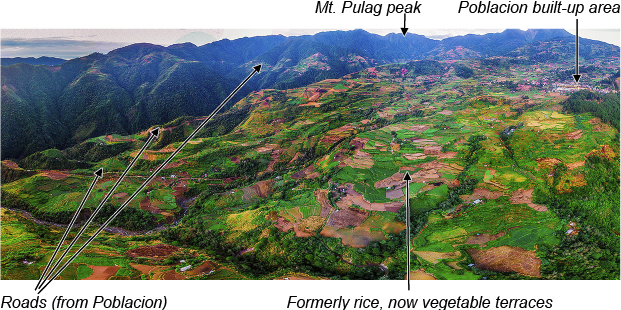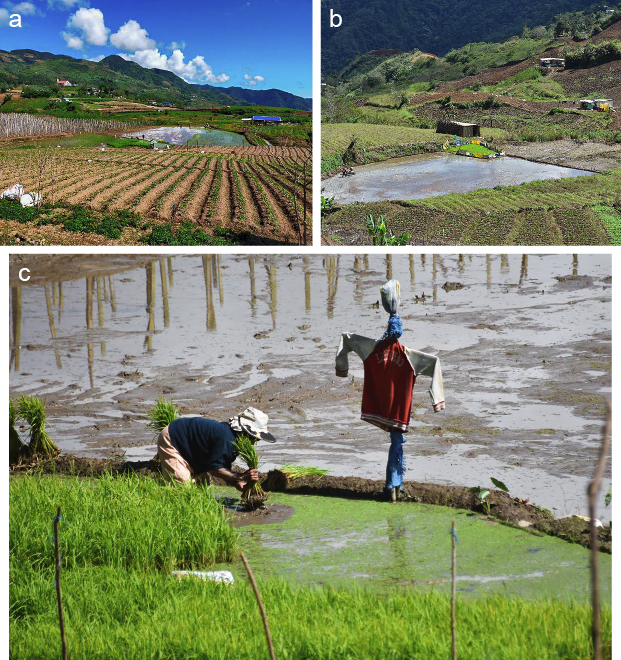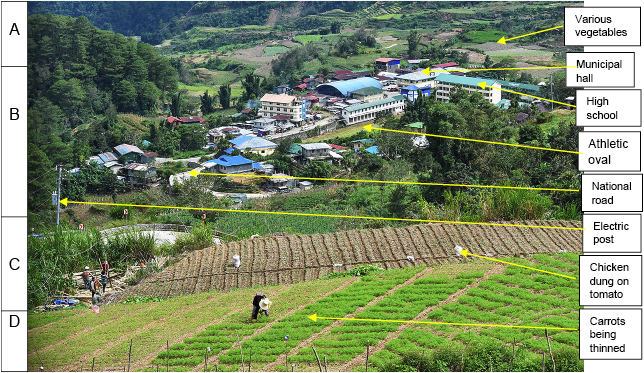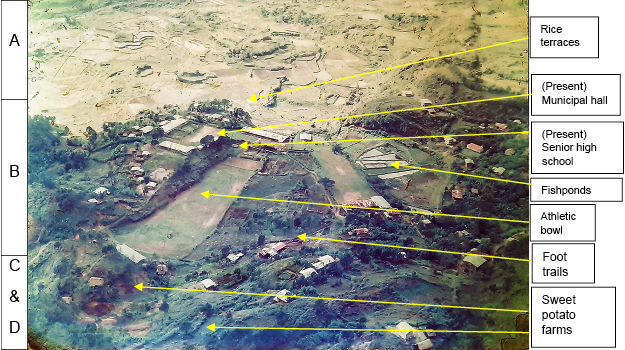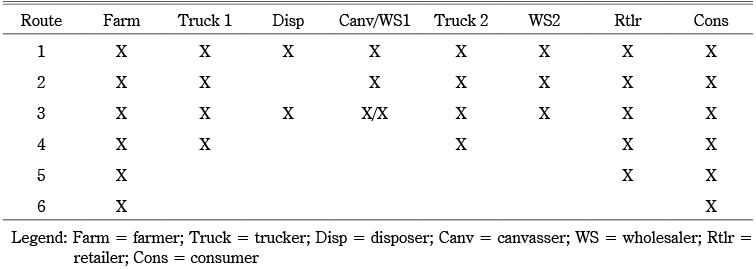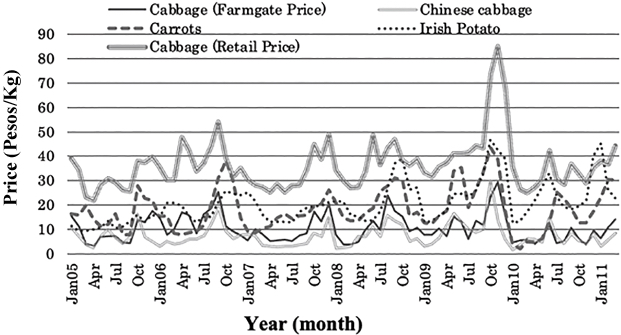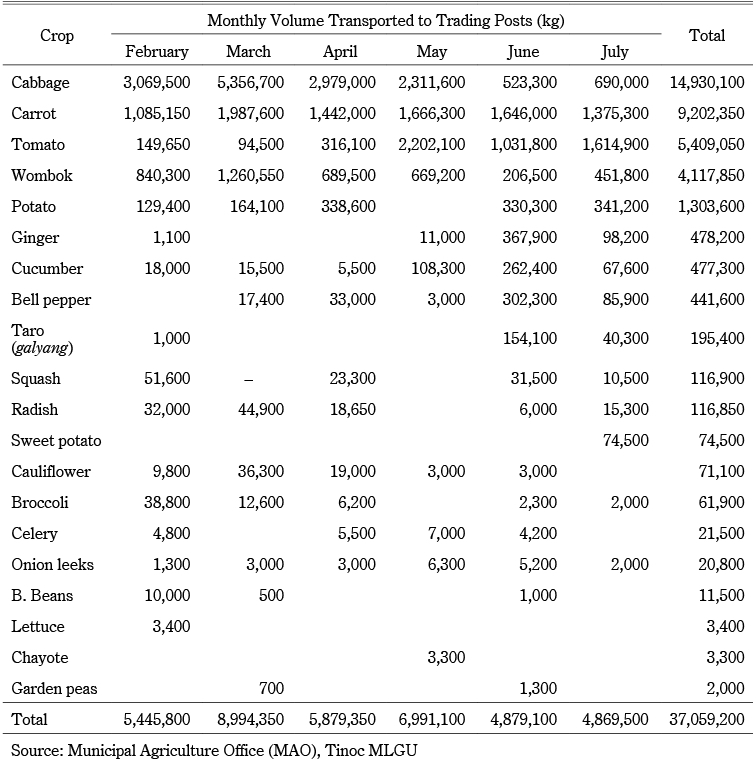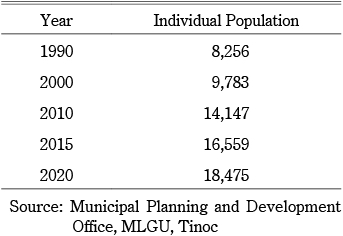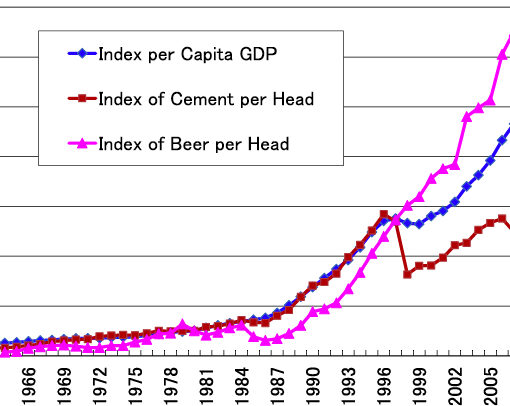Contents>> Vol. 14, No. 1
From Rice to Vegetable Terraces: Agricultural Transition and Sustainability in Western Ifugao, Philippines
Adrian Albano*
*Department of Social Forestry and Forest Governance, University of the Philippines Los Baños, 1/F Gregorio Zamuco Hall, Makiling St., Laguna 4031, Philippines
e-mail: alalbano[at]up.edu.ph
![]() https://orcid.org/0000-0002-3803-5212
https://orcid.org/0000-0002-3803-5212
DOI: 10.20495/seas.14.1_37
In western Ifugao, traditional agricultural land uses, including rice terraces, were sustained for centuries, only to be recently converted into vegetable landscapes. Through a historical landscape analysis supported by ethnographic research methods such as participatory observation and interviews, this paper describes the agricultural transition of the Kalanguya Indigenous Peoples (IPs) occupying Tinoc, in Ifugao Province. Irrigated rice cultivation in this high-altitude part of Ifugao is carried out more for its cultural significance than for food security. As the area gradually opened up and became connected with the mainstream economy, rice was increasingly outsourced and the rice terraces were gradually replaced with temperate vegetable cultivation. The temperate climate made the area marginal land for rice but prime agricultural land for temperate vegetables. Extensive rice terraces and formerly swidden farms and forests were transformed into “vegetable terraces.” Despite its climatic suitability and income potential, the transition to vegetable farming has had negative ecological and sociocultural consequences. Possible pathways to local sustainability are discussed following the concept of ecological intensification.
Keywords: rice terraces, vegetables, Indigenous Peoples, Ifugao, Cordillera
Introduction
The global community made a commitment to sustainability with the adoption of the 2030 Agenda for Sustainable Development (UN General Assembly 2015). However, translating the ambitious Sustainable Development Goals (SDGs) into tangible actions at the local level remains a challenge. This is particularly true in communities that have historically achieved a delicate balance between their economic, environmental, and sociocultural well-being but now face sustainability threats along with rapid agricultural transformation.
In the Philippines, Ifugao, rice terraces, and sustainability are almost synonymous. The province of Ifugao has picturesque, centuries-old, relatively vast rice terraces that attract tourists and sustainability researchers. The Ifugao rice terraces have been included on the Food and Agriculture Organization’s list of Globally Important Agricultural Heritage Systems (GIAHS) (FAO 2023) and UNESCO’s World Heritage List (UNESCO 2023). In western Ifugao, however, particularly in the municipality of Tinoc (Fig. 1), a different agricultural landscape is fast emerging: vegetable terraces and vegetable-dominated landscapes being carved out from traditional land uses including rice terraces, swidden farms, and forests.
Fig. 1 Study Location
a) Philippines
b) Cordillera Administrative Region
c) Tinoc (Barangay Eheb shaded), Roads to Baguio and Bambang Markets
This rapid conversion of traditional land uses to commercial vegetable landscapes is a concern not only for permanently vanishing, globally important rice terraces but also for globally (and locally) important forests. The issue has not been well reported or addressed, partly because studies on Ifugao rice terraces have been focused on the more accessible and touristic municipalities in central Ifugao. Awareness of Tinoc’s rice and vegetable terraces could inform future policies and programs targeting these and other areas undergoing similar agricultural transition, such as the more famous heritage landscapes of central Ifugao.
This paper starts with an ethnographic account of the Kalanguya Indigenous Peoples in Tinoc, Ifugao Province, including a description of the people’s natural environment, traditional agriculture, and local culture. It is followed by a historical narrative on how vegetable production replaced the production of rice and sweet potatoes. A closer look at the local vegetable industry shows the rationality in the transformation of rice terraces and the wider landscape into vegetable gardens. There are, however, negative trends and emerging sustainability issues, and so the paper closes with a discussion of alternative pathways toward local sustainability.
Research Methods
This research was conducted over a long period. The author grew up in Tinoc (1984–92), then lived there intermittently from 2008 to 2023, experiencing firsthand the cultivation of rice, sweet potatoes, and later vegetables. He conducted his doctoral fieldwork in Tinoc from 2010 to 2012 and returned from 2017 to 2023 as a member of the faculty at a local university. He is the administrator of the Ifugao Highland Farmers’ Forum—a social media community page he created as a platform for information exchange among vegetable farmers and other industry actors—where there has been some discussion of sustainability issues and pathways.
The agricultural transition from rice to vegetable cultivation is illustrated through a combination of GIS-based land-use analysis, satellite images, and landscape photos. The case study of Barangay Eheb is used to compare changes from traditional to recent land use. The traditional land-use map of Barangay Eheb is based on a topography map prepared by the National Mapping and Resource Information Authority in 1979. The 2010 land-use map is based on a WorldView-1 satellite image of the village taken in March 2010 (Fig. 2). Satellite images of the vegetable terraces of Barangay Poblacion, Tinoc, have been obtained from Google Earth.
Fig. 2 Traditional Land Use in Barangay Eheb, 1979
Information on the history of the Kalanguya people, including their past landscapes and agricultural practices, migration, and genealogy, was sourced from a literature review of studies on Kalanguya and Tinoc, Ifugao, supplemented by key informant interviews. Key informants are those regarded in the community as knowing some aspects of local history based on oral narratives. Secondary data on vegetables, such as volume and prices, was sourced from the Municipal Agricultural Office of Tinoc, the Philippine Statistics Authority, and the social media pages of local wholesale vegetable markets.
Kalanguya Indigenous Peoples and Their Traditional Land Uses
Study Location and Kalanguya Indigenous Peoples
Tinoc (Lat: 16°40'9.13''N, Long: 120°56'23.95''E) is located in the westernmost municipality of the province of Ifugao, adjacent to the provinces of Nueva Vizcaya to the south, Benguet to the west, and Mountain Province to the north (Fig. 1). It is a fourth-class municipality with an area of around 37,000 hectares. The tri-border area of Tinoc (Ifugao), Nueva Vizcaya, and Benguet is the peak of Mount Pulag, which at 2,922 meters above sea level is the highest point in the Luzon islands. Tinoc is characterized by high-altitude terrain ranging from 800 to 2,922 meters above sea level (although the peak is a point of contention as it has a boundary with Benguet Province), relatively low temperatures compared to the country’s warm lowlands, and steeply sloped mountains. It is in this environment that its inhabitants have been carving out the landscape for their livelihood, including the construction of rice terraces.
Tinoc is inhabited mostly by Kalanguya Indigenous Peoples, one of the three major ethnolinguistic groups in Ifugao (the other two being Tuwali and Ayangan). Kalanguya belongs to the Southern Cordillera group of languages, while Tuwali and Ayangan belong to the Central Cordillera group of languages (Himes 1998). As of 2020, the population of Tinoc was 18,475 individuals.
Traditional Agricultural Land Uses in Tinoc
The word “traditional” is used here primarily to distinguish previous land uses from the current dominant land use in Tinoc—commercial vegetable farming. There may have been other agricultural land uses, such as taro cultivation, before rice terraces (Acabado 2012), but for the purpose of highlighting the recent and ongoing agricultural transition to vegetable farming, traditional agricultural land uses in Tinoc refer mainly to the production of two main staple crops: rice and sweet potato.
Rice is produced in irrigated terraces, while sweet potato is cultivated in swidden farms. According to the Food and Agriculture Organization’s GIAHS Project, Tinoc has a relatively small area of rice terraces—517 hectares of the 17,000 hectares in the whole of Ifugao (FAO 2023). This figure, however, is probably based on areas that are visibly being cultivated and does not include long-abandoned and “invisible” rice terraces, many of which are found in Tinoc. In another measurement of the rice terrace area in Tinoc (during the making of a three-dimensional map of Tinoc land use in 2010), the estimated rice terraces covered 922 hectares. Nevertheless, both estimates show relatively limited rice terraces in Tinoc compared to its neighbors in central Ifugao.
An early historical account of the rice terraces near Tinoc was in 1789, where Fr. Francisco Antolin narrated the travels of two Christians (from the lowlands of Nueva Vizcaya) who went to the “land of the Igorots” with “pagan guides from Tinok”:
There was somebody who told them, “Don’t leave us so soon; wait for our fiesta at the harvest of the rice plots and see the killing of the carabaos and pigs, first in one town, then another, and then in others, and see the crowds and merrymaking.”
Our people told them, “From the poor rice fields we’ve seen, so many fiestas?”
To this the pagans replied, “We don’t eat so much rice as the Christians; if we have gabe (taro) and camotes [sweet potatoes] for food, and a little rice for our beverages . . . we’re quite content.” (Antolin and Scott 1970, 227)
The Christian travelers from Nueva Vizcaya did not make it to Tinoc, since their guides—who were from Tinoc—told them that Christians were not welcome there. Thus, their description of “little fields in the ravines” and “poor rice fields” (Antolin and Scott 1970, 227) was not of Tinoc. It is significant to note, however, the statement that the staple food of the people was root crops (taro and sweet potato), while rice was mainly for making beverages, particularly rice wine. Interestingly, more than two centuries later, similar accounts were offered by key informants in Tinoc about the roles of sweet potato and rice—even until the late 1980s, before the introduction of temperate vegetables.
In Barangay Eheb, rice farmers—particularly those with small total areas (i.e., less than 0.25 hectare)—as well as sharecroppers produce rice mainly to make tapey or rice wine, a culturally important beverage, especially in the social status-defining redistributive feasts called keleng or padit. Based on the identified rice terraces during field research in 2012, including existing and abandoned ones, the area traditionally planted with rice in Eheb was only around 12 hectares—or only 1 percent of the total barangay area. Fig. 2 shows the land use of Eheb in 1979—a typical land use in the municipality of Tinoc: permanent but still limited areas of rice terraces, shifting patches of swidden farms for sweet potato, grass and open areas, and forests (secondary, pine, and montane).
Despite the significantly large area of terraces in the higher-elevation barangays of Tinoc—locally referred to as Upper Tinoc and including Barangays Eheb and Poblacion—their rice yields were significantly less than yields from terraces in Lower Tinoc, primarily because of their low temperature (their altitude ranged from 1,100 to 1,400 meters above sea level, while the Lower Tinoc terraces were less than 1,000 meters above sea level). The Eheb rice terraces are located downriver between mountain peaks that block the rising and setting sun. Rice production in Eheb—and Tinoc in general—is limited also because farmers there grow traditional local rice varieties, which take six to seven months from planting to harvesting.
Compared to rice, sweet potato requires less labor to cultivate. It can be grown even on unterraced slopes and in higher altitudes, producing harvestable tubers six to seven months after planting and continuously thereafter for the same or even a longer duration; thus, the yield per hectare is higher than rice. Most important, sweet potato is used to feed pigs and chickens. Both these animals have dietary, religious, and commercial importance for the people of Tinoc, who are known to regularly supply them to mining communities in Benguet (Lewis 1992).
Sustainability of Traditional Land Uses
Given the similarities in the accounts about agriculture in Tinoc in the 1980s and further back in the 1780s, it seems logical to conclude that traditional land uses have been “sustained” and are therefore sustainable. However, the fact that they lasted for at least two centuries may not necessarily mean that these traditional land uses are “sustainable” and are thus to be idealized in imagining a sustainable community for Tinoc. A closer look needs to be taken at how these traditional land uses lasted for at least the past two centuries.
Among the eight “places of the Igorot tribe of Tinok” mentioned by Fr. Antolin in 1789, only two—Tococan and Poliang—are recognizable. Ahin—often said to be the origin of the Kalanguya—appears in written records only as one of the targets of a series of expeditions by the Spanish colonial government’s military from the 1850s until the 1870s. It is worth noting that most of the rice terrace owners in Barangay Poblacion found these terraces abandoned. One person in Barangay Poblacion who came from Ahin around the 1900s was said to have been exceptionally industrious in repairing abandoned rice terraces (including irrigation), which explains why his descendants owned relatively extensive rice terraces. Meanwhile, there were mentions of Kalanguya outside Tinoc owning some rice terraces back in Tinoc but not knowing their locations since their parents outmigrated and never took them back to Tinoc.
There is still a dearth of information on what happened in Tinoc between the 1780s and the end of the Spanish colonial government, but related literature discusses migrations out of Tinoc toward Nueva Vizcaya (Rice 2008) and Benguet (Bagamaspad and Hamada-Pawid 1985). Various causes were identified for the permanent outmigrations from Tinoc, notably the Spanish colonial government’s punitive missions in neighboring settlements (and more likely within Tinoc), constant threats from enemies who raided villages for human heads (i.e., the common practice of headhunting), epidemics such as smallpox (Newson 2006), and famine (Scott 1974; Bagamaspad and Hamada-Pawid 1985; Afable 1989). Adding to the outmigrations during the Spanish and American colonial periods was the mass migration with a high mortality rate during World War II. Tinoc, which was then part of the present municipality of Hungduan, played a strategic role in the last stand of the Imperial Japanese Army in the Philippines.
It is not difficult to associate rice terraces and even swidden farming with sustainability. They have lasted for at least two centuries in Tinoc, proving that they are ecologically sustainable. Alongside the ecological sustainability, however, have been social unrest and even economic disasters from regular crop failures resulting in famines, locally referred to as hi-bitil. It is not surprising that with gradual improvements in the political and market environment over time, along with changes in the needs and aspirations of the people tilling the land, traditional agricultural land uses also started to transform.
Introduction of Vegetable Farming
Political and Market Integration
After the United States took over the Philippines from the Spaniards in 1898, social and physical barriers between ethnolinguistic groups began to ease as a consequence of the American colonial government’s policy to be friends with “non-Christian tribes.” Unlike their neighboring groups, however, the Kalanguya were not recognized as a separate tribe or ethnolinguistic group. Despite being integrated into the national government, they remained invisible and on the periphery of politics. It was only in 1983 that Tinoc became a municipality separate from Hungduan—a municipality inhabited primarily by rice-farming Tuwali speakers from central Ifugao.
In the 1980s, economic activities in Tinoc remained limited. Many Kalanguya left for employment opportunities elsewhere. One major employment opportunity at the time was in the booming temperate vegetable industry that started in Baguio. The industry emerged primarily to satisfy American demand for temperate vegetables and later fed the ever-increasing demand for temperate vegetables in warm cities such as Metro Manila. Vegetable landscapes followed the construction of the Mountain Trail (also called Halsema Highway) as it branched out from Baguio City to interior areas of the Cordillera such as Buguias, Benguet Province, and toward Bontoc, Mountain Province, near Tinoc.
Road to Vegetable Farming
Vegetable cultivation by the Kalanguya Indigenous Peoples began in the adjacent municipalities of Buguias, Benguet Province, and Bauko, Mountain Province, when Tinoc was still inaccessible by road. In the mid-1980s, as road construction reached Sitio Bot-oan in Barangay Catlubong (Buguias Municipality, Benguet Province), vegetable cultivation had already started in Tinoc with garden peas (Pisum sativum) as the predominant crop, since this was relatively light to haul. The long distance from Tinoc to the nearest road in Benguet made manual hauling expensive. In fact, when the road was still farther away, some farmers grew marijuana—a much lighter but more valuable (though illegal) agricultural commodity.
During the earlier years of vegetable cultivation in Tinoc (1980–90), vegetables were hauled for around four to five hours to the nearest accessible road of Sitio Bot-oan, where consumer goods were then purchased and hauled back to Tinoc. In 1992, after on-and-off construction works, the dirt road to Tinoc was finally passable for four-wheel-drive trucks. As road access improved, vegetable cultivation extended, intensified, and diversified.
The extensification of vegetable gardens was made easier by the availability of earthmoving equipment, usually the same equipment used in road opening and widening projects. Earlier, bulldozers were favored; but the preference today is for the backhoe or excavator, as the latter allows for greater slope maneuverability and enables better conservation of the more fertile topsoil during land clearing and terracing. Example of a backhoe at work is shown in Fig. 3. They are mostly secondhand imports from Japan, along with secondhand Japanese trucks enhanced to carry more than their original carrying capacity and pass through landslide-prone dirt roads.
Fig. 3 Backhoe Overturning Garden Soil and Re-terracing Vegetable Garden with Partially Harvested Chinese Cabbage or Wombok; Lower Vegetable Terraces Have Unharvested Wombok and Carrots (photo by Adrian Albano). Backhoe is also used in road-widening projects, and clearing forests for vegetable expansion.
Intensification in vegetable gardening was made possible with the ease of bringing in farm inputs, especially the heavy chicken dung that is the main source of fertilizer for vegetables. Chicken dung is brought in as a “backload” or return load after trucks take vegetables to the wholesale markets. The intensive use of fertilizers enables farmers to skip a fallow period and to start land preparation immediately after harvesting. The types of temperate vegetables being planted have changed from lighter sweet (green) peas to heavier vegetables such as carrots, cabbage, wombok or Chinese cabbage, potatoes, and more recently tomatoes.
In the case of Barangay Eheb, the opening of the barangay road going down from the main road started in 1995, and after ten years the road reached settlements in the lower part of the barangay. In 2010 most farmers in Eheb were engaged in vegetable farming. The rice terraces located downriver near the old village and far from the road were mostly abandoned (Fig. 4), although vegetable cultivation began there after the road finally reached it in 2020.
Fig. 4 Land Use in Barangay Eheb, 2010
A similar process occurred in the larger landscape of Tinoc. In 2010, a land-use map of the entire municipality of Tinoc was prepared by a group of nongovernment organizations in cooperation with the local municipal government of Tinoc and local communities (Fig. 5). Although there were challenges in accurately portraying actual land use, this 2010 land-use map captures the extensive expansion of vegetable gardens, with an estimated area of 2,384 hectares. The actual vegetable area must have been higher considering that a large portion of the indicated rice terraces in Tinoc (most extensive at the center of the map) had been converted into vegetable gardens by 2010.
Fig. 5 2010 Land-Use Map of Tinoc (Poblacion Payew or Rice Fields at Center) (map courtesy of Philippine Association for Intercultural Development)
Ifugao Vegetable Terraces
A 2019 satellite image of Poblacion shows its formerly extensive rice terraces no longer irrigated (usually they were irrigated even after the rice was harvested), as they were now being planted with vegetables (Fig. 6).
Fig. 6 2019 Satellite Image of Barangay Poblacion (Showing Vegetable Gardens That Were Formerly Rice Fields) (Google Earth)
A panoramic view of the same place in 2019 is shown in Fig. 7, additionally showing the abandoned and still uncultivated rice terraces near the river below.
Fig. 7 Poblacion, Tinoc, Ifugao (drone image courtesy of Melvin Lacbongan, September 2019)
Fig. 8 shows that as of February 2023, almost all the rice terraces in Barangay Poblacion (and in Barangay Eheb) were no longer planted with rice but with vegetables. A quick visit to Poblacion on February 1, 2023, which was within the rice planting season, showed only three small patches of rice fields being planted (Figs. 8a and 8b). In Barangay Eheb all its rice terraces are now planted with vegetables.
Fig. 8 Minimal Patches of Rice Fields Surrounded by Vast Vegetable Landscape in Poblacion, Tinoc
a) Small (400 sqm) Rice Parcel with Vast Vegetable Gardens in the Background (photo by Adrian Albano, February 1, 2023)
b) Rice Parcel with Former Rice Terraces in the Background, Intentionally Unflattened and Unterraced for Vegetable Cultivation (photo by Adrian Albano, February 1, 2023)
c) Elderly Woman Planting Rice (Diket or Glutinous Rice) in the 400 sqm Rice Parcel, Which Is, According to her Grandson, “To Keep Her Occupied with What She Used to Do” (photo by Adrian Albano, February 1, 2023)
Two interviewees said that the small rice fields were still being cultivated mainly to keep their elderly family members busy rather than bored. The interviewee in the case of the rice terraces in Fig. 8b, Elmo Ummas, added that he thought it was an unfortunate waste to see the rice terraces being destroyed and converted into vegetable gardens. The rice parcel in the photo is what was left after its surrounding rice terraces were “destroyed,” having been converted back into sloping terrain, which is now the ideal terrain to prevent flooding for vegetable gardens. The water was being siphoned off by other farmers with vegetable farms closer to the water source. Moreover, the interviewee mentioned the challenge of cultivating a relatively large tract of rice field when most neighbors were already farming vegetables: it would be difficult to exchange labor (maki-ubbu) with vegetable farmers who had a distinct cropping schedule and who would prefer to exchange labor with their fellow vegetable gardeners.
Fig. 9 (9a and 9b) shows a closer and comparative look at the present and pre-vegetable landscape of Barangay Poblacion. Fig. 9a is a photo taken from the vantage point of Sitio Mugao, while Fig. 9b is a photo from an airplane that used to fly from Nueva Vizcaya to Tinoc airport. Comparing these two photos of Poblacion, taken from similar viewpoints, one can observe the agricultural landscape transition into commercial vegetables. The cultivated areas in the present landscape are all planted with vegetables (Fig. 9a). In the early 1980s, these areas were planted with traditional rice terraces (Fig. 9b, section A) and sweet potatoes (Fig. 9b, section D).
Fig. 9a Poblacion, Tinoc (photo by Adrian Albano, September 25, 2021)
Notes: A: Formerly Rice Terraces, Now Mainly Vegetable Terraces; B: Poblacion Built-up Area; C: Men Splitting Bamboo for Use as Poles for Tomato Plants on Parcel Newly Fertilized with Chicken Dung; D: A Woman Thinning Carrot Plants
Fig. 9b Poblacion, Tinoc. Early 1980s (aerial photo by John Hellman, US Peace Corps)
Local Vegetable Industry
Suitability of Vegetables vs. Rice and Sweet Potato
The high-altitude areas of Tinoc are considered marginal for rice, but they are prime agricultural land for temperate vegetables such as carrot, cabbage, tomato, wombok, and Irish potato. Along with the temperate climate, there is sandy loam soil that can easily be cultivated and drained even during continuous rain. Assuming no shortage in capital, a farmer could have three croppings a year. Rice can be harvested only once a year. On the other hand, sweet potatoes, despite continuously yielding root crops, still have significantly limited volume (and value) per unit area. The high income potential from vegetable production largely explains the shift away from rice and sweet potato.
In Eheb, almost all farmers are engaged in vegetable cultivation. A full-time farmer cultivates around 0.25 hectare, an average of 0.42 hectare per household, which is likely the case in most of Tinoc because of the labor intensiveness of vegetable cultivation. The cultivated area is greater for households with more members to help, such as the wife and children. There are out-of-school children (many in their teens) who operate separately from their parents. As farmers specialize in temperate vegetables, most of them now import rice from outside Tinoc. Rice is the staple food and is consumed with pork and chicken also mainly imported from outside, since farmers can no longer raise these animals along with commercial vegetables. Sweet potato is now a snack, often purchased from the vegetable trading post since few farmers are able to plant it.
Inputs and Financing
Temperate vegetables have high income potential but require a cash outlay, especially for purchasing inputs. Cash is always limited, but for many farmers in Tinoc, securing inputs is not much of a problem because these may be accessed via various credit arrangements. There are providers of inputs and cash on credit who are colloquially known as “suppliers” for creditworthy farmers. A two-tier financing arrangement is often observed. The first level is between the farmer and a local supplier who can closely monitor the farmer. The second is between the local supplier and a larger supplier who is usually a trader of farm inputs, based at a vegetable trading post. Suppliers provide inputs (seeds, fertilizers, and pesticides) and sometimes even consumer goods and farm equipment such as power sprayers and hand tractors. In return, the suppliers get the exclusive right to dispose of or sell the farmer’s produce with their usual commission or price cut. The commission varies per vegetable, per prevailing price, and per trader/supplier. The profitability of credit (supply) provision, however, attracts not just traders but even farmers and non-farmers who are able to accumulate enough capital. There is a continuum of farmer-supplier agreements in terms of profit-sharing arrangements, each with different risk implications for both supplier and farmer. A relatively common arrangement is dinnulin, where all expenses are accounted for and later deducted from gross sales, and the remaining amount is divided 50:50 between the farmer-laborer and supplier.
An equally important task where there is a need for financing is land terracing. Instead of manual labor using a spade and garden hoe, most terracing is now done using backhoes, which are used also in opening roads (see Fig. 3). If new farms and vegetable terraces are not close to the main road, this means the opening of private roads to connect to the main road. Payments may be by the hour (PHP 1,500–2,000/hr) or per task completed (kontrata). Interestingly, some equipment owners offer payment in kind: for instance, they open a road in exchange for the exclusive right to supply the farmer, which includes the right to transport and sell the farmer’s produce, usually for at least five years. This makes financial sense to the equipment owner considering that truckers, who include equipment owners, charge PHP 3.50–5/kg when transporting vegetables from the farm to the trading post. Another form of payment in kind is through giving a land parcel to the equipment owner in exchange for private road construction and other earthworks.
Marketing
During harvesting, vegetables are immediately loaded onto trucks that transport them to the trading posts in La Trinidad (Benguet Province) or Bambang (Nueva Vizcaya). Thus, the farmers do not sell the vegetables themselves but via their “disposers,” who are usually their suppliers of inputs or farm credit. Disposers pass on the vegetables (with at least a PHP 1/kg commission) to buyers coming from other wholesale markets in the cities or to canvassers who act as buyers for people not physically present in the trading post (i.e., factora). Since vegetables are perishable, especially when they are piled inside the trucks, a delay in selling and repacking from the truck could mean significant losses in quality and net saleable weight. Buyers usually deduct around 5–10 percent from the total weight of selected vegetables to hedge against such possible losses. Following the standard market chain from farmer to consumer, the chain routes for vegetables from Tinoc are summarized in Table 1.
Table 1 Market Routes of Vegetables from Farmers in Tinoc to Consumers
According to Table 1, Route 1 is when a farmer or their disposer agrees to a canvasser to sell their vegetables directly to buyers who come with their trucks to the trading post. In Route 2 the farmer or direct supplier sells to a wholesaler, who could be the main supplier or just a favored buyer having earned farmer loyalty. In Route 3 a farmer sells to a canvasser who sells to a trader/wholesaler within the trading post. This often happens when a farmer is not aware of the prevailing price and is offered a price by a canvasser who, using various forms of reasoning (even without enough cash), convinces the farmer to sell their vegetables to them without checking other buyers. Route 4 was tried by one Kalanguya trader interviewee who attempted to sell directly to retailers but at greater business risk. Route 5 describes vegetables sent by farmers directly to retail shops outside Tinoc, usually in relatively small amounts and prepackaged for retail. Route 6 is similar to Route 5, but the vegetables are sent to relatives, usually students studying outside Tinoc.
Vegetable Prices
Given the small-scale and speculative nature of vegetable production in the Philippines, the price of vegetables in the trading posts is very volatile. In addition, vegetable prices are susceptible to natural calamities, particularly typhoons, many of which occur in the Philippines every year. Based on the graph of the monthly price of the major vegetables produced in Tinoc, prices regularly peak during September–December, which is the typhoon season in the Philippines (Fig. 10). These typhoons can destroy many standing crops and also often cause landslides, blocking the delivery of vegetables from farms to the trading posts. There have also been cases when vegetable prices were down, only to be attributed later to massive imports (Quitasol 2023).
Fig. 10 Monthly Farmgate Price of Major Vegetables (2005–11) (Department of Agriculture-Bureau of Agricultural Statistics)
Aside from factors that have a long-term effect on vegetable prices, prices at the trading posts may vary significantly even over a few hours. On the other hand, retail prices fluctuate less. The retail prices of temperate vegetables in their major destination—the greater Manila area—may be 100–400 percent of the farmgate price, as shown in the monthly retail price of cabbage (Fig. 10).
Volume and Daily Traffic of Tinoc Vegetables
Despite years of producing vegetables for the market and continuous extensification, Tinoc vegetables remained invisible in government statistics. One reason was that the vegetables were sold in trading posts outside the province of Ifugao. From February to July 2020, in a move to lobby the national government for agriculture-related projects, the local government of Tinoc tried to estimate the volume of vegetables coming out of Tinoc. They designated persons located on the municipal exit roads to collect the following information: name of farmer, barangay, crop, type of vehicle, plate number, volume estimated, and destination. The estimated volumes of various vegetables produced in Tinoc from February to July 2020 are presented in Table 2.
Table 2 Volume of Vegetables Produced in Tinoc, Ifugao (February–July 2020)
The millions of kilos of vegetables coming out of Tinoc monthly reflect the extensiveness of vegetable gardens already established. They also show the variety of temperate vegetables being produced and the dominance of cabbage, carrot, tomato, wombok, and potato. On a normal day (i.e., without landslides hampering transportation), there could be at least twenty vegetable trucks taking produce to La Trinidad or Bambang.
Trends and Sustainability Issues
Focusing on the completely converted rice terraces of Barangay Poblacion in the municipality of Tinoc, and expanding the view to include the surrounding landscape, one can see that the ongoing landscape transformation is unsustainable. This is shown by the following economic, ecological, and social indicators.
Higher Potential Income, Higher Potential Bankruptcy
Vegetable farming is colloquially equated to gambling, where farmers who are able to sell their produce at high prices are said to have hit the jackpot. Indeed, vegetable cultivation has made several farmers instantly rich, but it has also left others in previously unimagined debt. In times of a vegetable glut, it is common to see vegetables dumped along the roads or just left unharvested, which happens almost every year. Many times the dumping of vegetables from Tinoc has caught national media attention through newspaper articles (Visaya 2020; Department of Agriculture 2021; Cariaso and Domingo 2023). Meanwhile, the price of inputs—particularly fertilizers, insecticides, herbicides, and fungicides—continues to increase. While input suppliers (pesticide and fertilizer companies) have control over the total volume and selling price of their product, vegetable farmers do not have control over either. Their production is based mainly on their speculation of the future selling price of the vegetable based on their estimate of future demand, typhoon occurrence, and what other farmers may plant—all highly unpredictable variables. Of course, it often comes as a surprise for farmers to learn of massive importation of vegetables, because these can be locally produced with the Department of Agriculture’s encouragement. On the other hand, small-scale and disorganized vegetable producers in the country sometimes do not produce enough of certain vegetables, which leads to astronomical increases in domestic prices, enough to motivate vegetable smugglers to bring in imports. Whether jackpot or bankrupt, the usual tendency for vegetable farmers is to try harder next time, intensifying (spending more on inputs over the same area) and extensifying (expanding the existing garden plot or opening new areas) their vegetable farms.
Decreasing Soil Fertility, Soil Erosion, and Landslides
Farmers notice a gradual reduction of soil fertility with continuous vegetable cultivation. One farmer (A) who has been cultivating his farm for 15 years says the average size of carrots he harvests has been reduced to half compared to when he started cultivating. Conversely, he is now applying more than double the amount of chicken dung—the main fertilizer used for vegetables—that he used to.
Compared to rice terraces, vegetable terraces do not necessarily have a flat base (planting area) because aside from being labor-expensive, flat terrace bases have a smaller planting area than terraces with a sloping base. The latter also prevent flooding. However, the more sloping the soil surface, the more vulnerable it is to soil erosion and nutrient leaching. Soil erosion can be observed not just in vegetable gardens but especially along newly opened roads. There was a massive landslide in 2008 on an adjacent mountain (Lat: 16°42'21.27''N; Long: 120°56'32.37''E). Whether it was caused by too much rain or deforestation is not clear, but a satellite image of the landslide shows the mountaintop to have been cleared, partly terraced, and with road access.
Health Problems
Farmers are aware of the health risks of vegetable cultivation. Aside from several stories of illness after spraying pesticides (locally done without protective gear), Tinoc District Hospital staff identified the mishandling of chicken dung as a common cause of farmer illnesses such as typhoid. Chicken dung is especially unsanitary when it gets wet (it is also more smelly, sticky, and difficult to mix into the soil). Farmers buy it, usually dry, from chicken-dung dealers near trading posts or directly from poultry houses, transporting them as backloads on their trucks after delivering their vegetables. A water quality study by Robert Ngidlo (2013) confirmed that there was a high level of coliform bacteria in springs in Barangay Poblacion. One of the likely sources of coliform contamination that he identified was fresh chicken manure manually applied to vegetable gardens during soil preparation.
Water Shortage and Pollution
Many barangays experience problems with water supply for both domestic use and irrigation of vegetable gardens. Although watersheds have been identified for protection, these are threatened by the further expansion of vegetable gardens. For example, Eheb prepared a barangay land-use plan where some forests were identified and designated as watersheds and protected areas. However, farmers continue to expand their vegetable gardens into designated watersheds, triggering complaints from households living below the gardens that their water table would be—or may already have been—polluted. The problem is evident from the ubiquitous plastic pipes hanging and snaking along the national road from the mountain springs of Mt. Pulag National Park, located at a higher elevation from the built-up areas and far from vegetable gardens. However, some of these mountain springs dry up during the summer, when there is a long drought, prompting some households to source their domestic water from lower-lying but potentially polluted water sources.
Population Boom and Other Concerns
The local government does not have a record of the population of Tinoc when it was separated from Hungduan in 1983. In 1990—before Tinoc was connected with a farm-to-market road—the population was 8,256, and after 25 years it had doubled (Table 3). The local population growth rate is expected to increase with a higher birth rate, labor migration from the still inaccessible barangays of Asipulo (Ifugao) and Ambaguio (Nueva Vizcaya), and migrant Kalanguya coming back to Tinoc to stake a claim to their ancestral land. Tinoc’s population boom is visible in the houses mushrooming conspicuously and even haphazardly along and near newly constructed mountain roads.
Table 3 Population of Tinoc, 1990–2020
Land Conflicts and (Conflict-Driven) Deforestation
The fortune that can be made from vegetable production in Tinoc has increased the value of land, especially near roads. This has often led to land conflicts. Many forest clearings are not intended for immediate cultivation, which traditionally was the case when forest clearing was primarily for swidden cultivation. Rather, recent clearings are done simply to strengthen ownership claims over the land. Due to competing land claims and the absence of land titling, land conflict is common, even within clans or close kin. Amidst the land conflicts, it is worth noting that all vegetable gardens and nearby forests are already locally recognized to be privately owned. Ownership claims are stronger in lands near the roads, partly because boundary conflicts in these areas were settled earlier. For a detailed description and discussion of individual as well as collective strategies to privatize forests, and the legal pluralism in Tinoc, see Albano and Takeda (2014) and Albano et al. (2015).
According to Global Forest Watch (2023), by 2021 Tinoc had lost 1,580 hectares—or 7 percent—of tree cover since 2000. Without intervention, vegetable terraces will continue to encroach into the remaining forests and this unsustainable trend will continue along with the abovementioned unsustainable trends.
Discussion: What Are Some Possible Pathways to Local Sustainability?
The rice terraces and swidden farms of sweet potatoes may have been “sustained” for generations in western Ifugao, but these farms planted with the same traditional crops would not have been enough to feed an increasing population with an increasing appetite for rice and other consumer products. The transition to commercial vegetables was logical, enabling the Kalanguya to provide for themselves—though they still had to source rice, sweet potato, meat, and even rice wine from outside. Since it is not practical to go back to the traditional agricultural land uses dominated by sweet potato and rice, how should local sustainability be imagined and pursued?
Interventions directed at achieving local sustainability in Tinoc would have to be imagined with temperate vegetables as the primary agricultural product. This is important in setting the direction of local policy. As a policy guide, this means accepting the practicality and better suitability of temperate vegetables compared to rice in high-altitude traditional terraces. Acceptance by the public is important for avoiding negative sentiments, especially on the part of outsiders seeing the former rice terraces transformed into vegetable farms. Indeed, even locals express their misgivings over the loss of the rice landscape.
Acceptance of vegetable farming and agreement among government agencies are needed also for focusing interventions on a sustainable local vegetable industry. Tinoc has been excluded from some rice productivity programs. For instance, it was not included in the GIAHS project. In hindsight, this non-inclusion made sense because no project could have prevented the conversion of rice terraces in the high-altitude barangay of Tinoc into vegetable farms. On the other hand, Tinoc has also been excluded from various vegetable support programs as these are implemented mostly in Benguet Province, the better-known producer of temperate vegetables. This can be attributed to the lack of national data showing sources of produce but also with the association of the province of Ifugao with rice terraces. Given the public sentiment about the unabated expansion of vegetable farming over traditional land uses, including forests, there should be no hesitation among external actors, including government agencies, to support vegetable production for a better, more sustainable future as imagined in the following discussion.
The future of Tinoc, without appropriate interventions, may be similar to some landscapes of Benguet Province: contiguous mountains of vegetable terraces with no watersheds. There is a need to change the current direction and follow alternative pathways. Unfortunately, there is a dearth of models of sustainability for temperate vegetable-producing areas in the Cordillera Region—in vegetable-producing areas in general, for that matter. Vegetable production has inherent negative ecological consequences, especially in the uplands (Midmore et al. 1996).
The ideal scenario in any agricultural system is to produce food without negative ecological consequences. However, this is almost impossible to achieve in the case of vegetables, with their ever-increasing demand and high dependence on fertilizers and pesticides. Nevertheless, there are improved technologies and processes that can help transition away from unsustainable practices. For this purpose, it is useful to introduce the concept of ecological intensification, defined as a means to make intensive and smart use of the natural functionalities of the ecosystem in order to produce food and ecological services in a sustainable way, including existing technologies associated with agroecology and organic and restorative agriculture (Tittonell 2014). Following this concept, Daniel Gaitán-Cremaschi et al. (2020) were able to categorize vegetable food systems in Chile based on variables that had an important impact on the degree of ecological intensification. Following their typology, the cases of Tinoc and most of the Cordillera vegetable food systems are closest to Type 1: small-scale farmers, conventional farming practices, multiple market intermediaries, etc. There are multiple pathways to vegetable production sustainability, and this comparison to existing typologies and pathways reveals the need for multilayered (production to consumption, individual farms to the larger landscape, farmers to cooperatives) and multi-sectoral (education, health, waste disposal, water, forest, transportation, organizations, etc.) interventions.
There have been certain initiatives to help vegetable farmers. One of these is the introduction of good agricultural practices and the certification of farmers who have adopted the relevant technologies (Bajenting and Fernandez 2017). There has also been marketing assistance from the Department of Agriculture, which buys directly from farmers at a price that would prevent them from dumping (and posting on social media). The extent of these interventions, however, has been limited and benefited only a select group of vegetable farmers.
Another form of intervention in the past was through organic vegetable production. Assistance was given to farmers in Tinoc who organized the Tinoc Organic Producers Multi-purpose Cooperative. Some members were able to secure interest-free government loans to build greenhouses for producing organic vegetables. However, organic vegetable farmers experienced other problems, such as the poor ability of their federation based in La Trinidad to market their products. Members of that federation are graded according to their years of membership, and in times of oversupply priority is given to longtime members. There are buyers within Tinoc, but they can purchase only a limited volume.
A more important concern that has not yet been effectively addressed is the continued expansion of vegetable farms into forestland, since there is ineffective governance of forests and natural resources. Under various national laws, natural resource governance is assigned to various government agencies. The national agencies directly involved include the Department of Environment and Natural Resources (DENR) and the Department of Agriculture, which act through their regional field offices. These national agencies are supported by local government units (LGUs) at the provincial, municipal, and barangay levels. Following the Indigenous Peoples Rights Act being implemented by the National Commission on Indigenous Peoples (NCIP), there are also Indigenous Peoples’ organization (IPOs) that hold the Certificate of Ancestral Domain Title—the landownership title issued by the NCIP to Indigenous Peoples. For the part of Tinoc classified as Protected Areas, which is part of the Mt. Pulag Protected Landscape, the management is directly under the Mt. Pulag Protected Area Management Board.
Despite the multiple bodies and laws for regulating vegetable expansion, past efforts have had limited impact. Although the scope of this paper does not cover the legal complexity of land use regulation, the discussion will briefly demonstrate the complexity of governance in the case of Tinoc. In response to the need of the people for roads and jobs, the government opened roads and encouraged agricultural expansion despite Tinoc being a Magat River watershed and its terrain well above the 18 percent slope limit for alienable and disposable land under the Revised Forestry Code. Fast forward to 2024, and the government continues to encourage vegetable production through the allocation of budget for farm-to-market roads and provision of farm inputs and equipment (as endorsed by local government officials based on their constituents’ expressed priorities). At the same time, the DENR, except for sporadic regulatory presence and actions by its local Community Environment and Natural Resource Office, has to look the other way as more roads cut through environmentally fragile slopes, terraces, and forests that surely will be followed by vegetable gardens.
Local community regulation is also limited, because, as one farmer put it, “everybody is guilty, because everybody benefited from illegal logging or forest clearing.” This farmer has reserved a portion of his privatized natural forest as a protected watershed. He recognizes the need for higher authorities to help regulate excessive forest clearing because, as he admits, community members (in the barangay, and even the municipal police) are not effective in regulating their fellow villagers and fellow vegetable farmers. Farmers doing new clearings may accuse local regulatory authorities of injustice, especially if they can prove that the area is their ancestral land. On the other hand, elected officials are cautious not to threaten farmers with legal repercussions for their forest clearings because they may lose the support of these farmers in the next election. Similar observations were made as early as the 1960s in adjacent Mt. Data (Kowal 1966) and Buguias (Lewis 1992), and vegetable expansion was unstoppable. The trends that are seen in Tinoc are also already being observed in rice terraces and forests in areas of central Ifugao such as Asipulo, Kiangan, Hungduan, and Banaue.
As has been recommended for Tinoc (Albano et al. 2015) and other municipalities of Ifugao (Daguitan 2010; Martin 2017), local resource governance could be improved through land-use planning. There must be strict compliance in the preparation of the municipal LGUs’ Comprehensive Land Use Plan (CLUP) and the Tinoc Kalanguya Indigenous Peoples’ Ancestral Domain Sustainable Development and Protection Plan (ADSDPP). Collaborative actions by various government agencies—particularly the LGU, DENR through its Community Environment and Natural Resource Office and the Mt. Pulag Protected Area Management Board, and NCIP—are crucial. There is a need for increased public awareness that can translate into voters’ demand for action from national as well as local elected officials. It is always a pleasant surprise to see such concerns expressed not just in social media but especially in mainstream media, such as the articles by Karlston Lapniten (2021) and more recently Iya Gozum (2024). The public, as consumers, can play a crucial role in sustainability efforts by expressing their preference for healthier, safer, and more sustainably produced vegetables through their purchasing practices, actually demanding and offering higher prices for such products. This way, vegetable farmers will be pressured to comply with such demand, including demonstrating proof of compliance with food safety and sustainability measures.
Concern over the cultural importance of rice terraces is not elaborated on here considering that this paper focuses on the economic rationale and practicality of converting rice terraces into vegetable farms. When it comes to preserving the cultural landscape as well as prioritizing economic needs, both cannot occur if the people choose to cultivate vegetables instead of planting irrigated rice. This said, Tinoc still has some rice terraces in its lower-altitude barangays. They remain under cultivation because rice continues to be economically viable in these areas. Cultural heritage conservation efforts could also be directed at the preservation of other symbols and expressions of Kalanguya culture, such as the larger landscape, materials, and practices outside rice terraces. The Kalanguya ancestral domain landscape still has natural forests with kalahan or non-pine trees along with diverse flora and fauna, which is relevant in protecting or preserving the economic and sociocultural integrity and identity of the Kalanguya Indigenous Peoples.
Conclusion
Traditional agricultural land uses in Tinoc were sustained for centuries partly because of historical outmigrations of people away from Tinoc as well as the area’s geographic remoteness: it became linked to the provincial road system only in the early 1990s. As Tinoc gradually became integrated with the rest of the country politically and economically, people went to work in the booming vegetable industry in nearby Benguet and then brought the expertise with them as road and market accessibility reached Tinoc. The temperate climate in the higher-altitude areas of Tinoc made these areas marginal for rice cultivation but prime agricultural land for various temperate vegetables. The relatively extensive rice terraces in the higher-altitude areas of Tinoc, as well as the former swidden farms and forests, have been transformed into vegetable terraces.
The ongoing agricultural transition in Tinoc yet again demonstrates the dilemma and uphill struggle in addressing sustainability goals in remaining forest communities as well as in globally important agricultural heritage landscapes. This is especially true when the people are employed mainly in agriculture, and when alternate crops prove to be superior (in terms of productivity and profitability) over traditional crops. Vegetable production now employs most local farmers and has become the dominant local industry. Prioritizing sustainability in a locality such as Tinoc would have to take into account relatively permanent vegetable gardens in the landscape, including on former rice terraces and swidden farms. In addition to the usual agricultural development and support services such as value addition and value-chain improvements, there would need to be parallel measures directed at protecting watersheds and landslide-prone landscapes. These conservation efforts would need conversations, dialogue, and agreements among various government agencies and stakeholders—like what has been envisioned in the Municipal LGUs’ CLUP or the Tinoc Kalanguya IPOs’ ADSDPP. The same processes of coming together, planning, and implementing are needed when dealing with wider concerns of cultural sustainability, including concerns over indigenous cultural heritage and values: there should be concerted community efforts toward common aspirations through clearer albeit multiple pathways.
Accepted: October 15, 2024
Acknowledgments
The author expresses his gratitude to: the various key informants and data contributors for this study especially the people in Tinoc, Ifugao; the Philippine Association for Intercultural Development, Inc. (PAFID) for sharing their maps and mapping resources; the reviewer and editors for the valuable comments and suggestions; the people of Japan for the scholarships (Asian Youth Fellowship, MEXT) that enabled the author to initially conduct this study; and to Prof. Takeda Shinya for being his doctoral dissertation supervisor under the Division of Ecology and Environment, Graduate School of Asian and African Area Studies (ASAFAS), Kyoto University.
References
Acabado, Stephen B. 2012. Taro Before Rice Terraces: Implications of Radiocarbon Determinations, Ethnohistoric Reconstructions, and Ethnography in Dating the Ifugao Terraces. Senri Ethnological Studies 78: 285–305.↩
Afable, P. 1989. Language, Culture, and Society in a Kallahan Community, Northern Luzon, Philippines, Vols. 1 and 2. PhD dissertation, Yale University.↩
Albano, Adrian and Takeda Shinya. 2014. Conserving Forests in Privatized Commons: Trends and Management Options in an Ifugao Village, Philippines. Journal of Small-scale Forestry 13: 1–17. https://doi.org/10.1007/s11842-013-9238-2.↩
Albano, Adrian; Van Dongen, Els; and Takeda Shinya. 2015. Legal Pluralism, Forest Conservation, and Indigenous Capitalists: The Case of the Kalanguya in Tinoc, the Philippines. Nature and Culture 10(1): 103–127.↩ ↩
Antolin, Francisco and Scott, William Henry. 1970. Notices of the Pagan Igorots in 1789. Asian Folklore Studies 29(1): 177–249. https://doi.org/10.2307/1177612.↩ ↩
Bagamaspad, Anavic and Hamada-Pawid, Zenaida. 1985. A People’s History of Benguet. Baguio City: Baguio Printing and Publishing Corporation.↩ ↩
Bajenting, Johanna O. and Fernandez, Rona T. 2017. Agri Office Encourages GAP Practice. SunStar. December 3. https://www.sunstar.com.ph/more-articles/agri-office-encourages-gap-practice, accessed October 26, 2024.↩
Cariaso, Bella and Domingo, Leander C. 2023. Dumping of Tomatoes in Vizcaya Confirmed. Manila Times. February 3. https://www.manilatimes.net/2023/02/03/news/national/dumping-of-tomatoes-in-vizcaya-confirmed/1876942, accessed February 5, 2023.↩
Daguitan, F. 2010. The Kalanguya’s Territorial Management: Panangipeptek ni Kalpuan ni Panbiyagan [Caring for our source of sustenance]. Baguio City: Tebtebba Foundation.↩
Department of Agriculture. 2021. DA-CAR Looks into Unsold Tomatoes in Tinoc, Ifugao. Department of Agriculture. September 28. https://www.da.gov.ph/da-car-looks-into-unsold-tomatoes-in-tinoc-ifugao/, accessed February 1, 2023.↩
Food and Agriculture Organization (FAO). 2023. Globally Important Agricultural Heritage Systems: Ifugao Rice Terraces, Philippines. FAO. https://www.fao.org/giahs/around-the-world/detail/philippines-ifugao/en, accessed February 20, 2025.↩ ↩
Gaitán-Cremaschi, Daniel; Klerkx, Laurens; Duncan, Jessica; et al. 2020. Sustainability Transition Pathways through Ecological Intensification: An Assessment of Vegetable Food Systems in Chile. International Journal of Agricultural Sustainability 18(2): 131–150. https://doi.org/10.1080/14735903.2020.1722561.↩
Global Forest Watch. 2023. Tinoc, Ifugao, Philippines: Deforestation Rates & Statistics. Global Forest Watch. https://www.globalforestwatch.org/dashboards/country/PHL/33/11/?category=biodiversity, accessed February 7, 2023.↩
Gozum, Iya. 2024. In Photos: The Road to the Vegetable Gardens of Tinoc, Ifugao. Rappler. May 25. https://www.rappler.com/philippines/road-vegetable-gardens-tinoc-ifugao/, accessed February 7, 2023.↩
Himes, Ronald S. 1998. The Southern Cordilleran Group of Philippine Languages. Oceanic Linguistics 37(1): 120–177. https://doi.org/10.2307/3623282.↩
Kowal, Norman E. 1966. Shifting Cultivation, Fire, and Pine Forest in the Cordillera Central, Luzon, Philippines. Ecological Monographs 36(4): 389–419. https://doi.org/10.2307/1942374.↩
Lapniten, Karlston. 2021. Sustainable Livelihood Offers a Lifeline to Philippines’ Dying Rice Terraces. Mongabay Environmental News. August 29. https://news.mongabay.com/2021/08/sustainable-livelihood-offers-a-lifeline-to-philippines-dying-rice-terraces/, accessed February 7, 2023.↩
Lewis, M. W. 1992. Wagering the Land: Ritual, Capital, and Environmental Degradation in the Cordillera of Northern Luzon, 1900–1986. Berkeley: University of California Press.↩
Martin, Marlon. 2017. The Rice Terraces of Ifugao Province, Philippines. Journal of World Heritage Studies, Special Issue (2017): 1–5.↩
Midmore, David J.; Jansen, Hans G. P.; and Dumsday, Robert G. 1996. Soil Erosion and Environmental Impact of Vegetable Production in the Cameron Highlands, Malaysia. Agriculture, Ecosystems & Environment 60(1): 29–46. https://doi.org/10.1016/S0167-8809(96)01065-1.↩
Newson, Linda A. 2006. Conquest, Pestilence and Demographic Collapse in the Early Spanish Philippines. Journal of Historical Geography 32(1): 3–20. https://doi.org/10.1016/j.jhg.2004.08.001.↩
Ngidlo, Robert T. 2013. Impacts of Pesticides and Fertilizers on Soil, Tail Water and Groundwater in Three Vegetable Producing Areas in the Cordillera Region, Northern Philippines. Journal of Experimental Agriculture International 3(4): 780–793. /https://doi.org10.9734/ajea/2013/4696.↩
Quitasol, Kimberlie. 2023. What Peak Season Sales? Veggie Farmers Hit Smuggling. Philippine Daily Inquirer. December 30. https://newsinfo.inquirer.net/1881273/what-peak-season-sales-veggie-farmers-hit-smuggling, accessed November 23, 2024.↩
Rice, Delbert. 2008. The Search for Abundant Life: The History of the Ikalahan of Nueva Vizcaya, Nueva Ecija and Pangasinan Philippines. AnthroWatch blog. April 1. http://anthropologywatch.blogspot.jp/2008_04_01_archive.html, accessed October 26, 2024.↩
Scott, William Henry. 1974. The Discovery of the Igorots: Spanish Contacts with the Pagans of Northern Luzon. Quezon City: New Day Publishers.↩
Tittonell, Pablo. 2014. Ecological Intensification of Agriculture: Sustainable by Nature. Current Opinion in Environmental Sustainability 8: 53–61. https://doi.org/10.1016/j.cosust.2014.08.006.↩
UN General Assembly. 2015. Transforming Our World: The 2030 Agenda for Sustainable Development. Resolution Adopted by the General Assembly on 25 September 2015 (A/RES/70/1). New York: United Nations. https://sdgs.un.org/2030agenda, accessed October 26, 2024.↩
United Nations Educational, Scientific and Cultural Organization (UNESCO). 2023. Rice Terraces of the Philippine Cordilleras. https://whc.unesco.org/en/list/722/, accessed February 6, 2023.↩
Visaya, Villamor Jr. 2020. Tomato Glut Forces Farmers to Dump Produce at Vizcaya, Ifugao Roadsides. Inquirer.net. June 4. https://newsinfo.inquirer.net/1286298/tomato-glut-forces-farmers-to-dump-produce-at-vizcaya-ifugao-roadsides, accessed February 1, 2023.↩

